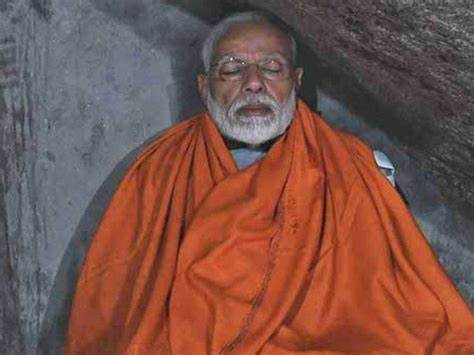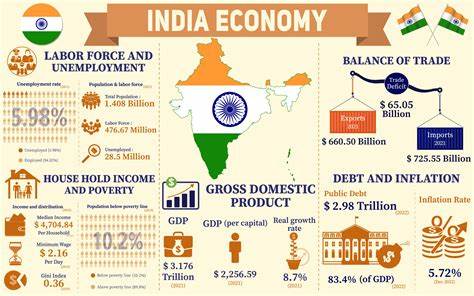Much will depend on Chandrababu Naidu, Nitish Kumar and Union Budget
(Shankar Raj)
In a way, the 2024 general elections has made everyone happy – the NDA is happy that it could come to power for the third consecutive time though badly bruised; the INDIA front is happy that it could give the NDA and Prime Minister Narendra Modi a tough fight; the Election Commission is happy that all the charges levelled against it on the EVMs have been proven wrong and the people at large are happy that India is a self- correcting democracy.

The only unhappy face in the lot is the ‘Bulls and Bears’ as the sensex plunged to its biggest loss of 4,390 points, wiping out Rs 31 lakh crore wealth in just one session on Tuesday.
The markets are likely to remain unsteady with occasional hiccups till the news of a new finance minister is announced and the economic path is made clear in the coming union budget. But one thing for sure is that the PMO’s stamp on the budget will remain faded for quite some time in the future. It would be replaced by the stamps of Telugu Desam chief Nara Chandrababu Naidu and Bihar’s strongman Nitish Kumar – the new alliance partners who hold duplicate keys to Modi’s treasury.
That said, experts feel the broad direction of the economy is unlikely to change. However, market reforms and privatization may take a back seat because the BJP will be dependent on the TDP and the Janata Dal (Secular) of Nitish Kumar to make key policy adjustments.

Secondly, there will be greater demand to stimulate consumption in the economy from both BJP and its allies. What needs flagging here is that both Naidu and Nitish Kumar Favour pro-reforms, especially in greenfield technologies. This is why Modi mentioned this in his post result address in Delhi to party workers Tuesday.

Among the two, Naidu will be more aggressive in asking for Favours and concessions to rebuild his capital Amaravathi in Andhra Pradesh on the same lines of what he did in Hyderabad, especially in the IT field. He already has a workable blueprint and is a very hungry and ambitious politician to put it into action.

Nitish Kumar too is not far behind and since he will be facing Assembly elections in Oct-Nov next year he will press for special status for Bihar and put the national economy under strain. If Bihar gets special status, Naidu too will demand the same for Andhra Pradesh.
Other sectors that would be pushed off the table would be reforms related to land, agriculture and labor. Privatization and asset monetization would face a strong wall. However, the central government’s focus on public infrastructure investment for supporting economic growth would remain intact or get a further boost.
Privatization would continue to get a boost in Defense and space technologies, especially in incorporating new technologies like Artificial Intelligence and Artificial Generative Intelligence – something that would get Naidu’s immediate approval.
However, Indian fund managers would want the current pace of economic reforms and pro-industry policies to continue under the incoming government.
But, foreign fund managers, who have been cautious on Indian stocks since the Lok Sabha polls started in April, are expected to maintain the status quo: Neither go on investing with fresh zeal nor take money out in droves. Foreign portfolio investors feel that the lower-than-expected Lok Sabha seats for the BJP could limit their decision-making bandwidth in the coming days.

All said, the new NDA government would not junk the much-talked about Prime Minister’s first 100-day plan. Sources in the government said the 100-day plan is very much in the works even if a coalition means the government would have to be selective in taking tough reforms measures.
The key agenda of the government in the first 100 days would be insurance sector reforms, changes in the Insolvency and Bankruptcy Code (IBC) and extension of the production-linked insurance (PLI) scheme.
The PLI scheme, launched with the aim of encouraging manufacturing, is yet to bear fruits in most sectors except in mobile manufacturing. The scheme, applicable to 14 sectors currently, may be expanded to a few more sunrise sectors. The government has been planning to tweak the scheme to make it more effective.
The Ministry of Electronics and Information Technology (MEITY) will likely undertake 20 key developments, including the launch of the IndiaAI Mission, amendments to IT Act and setting up of an apex digital public infrastructure (DPI) committee. The plan also includes expansion of current power producing capacity, policy changes for coal and hydroelectricity.
The election results may also not affect the IPO wave in India which has emerged as the second-largest IPO market on the world league table, raising $4 billion so far this year. With NDA returning to form the next government, hopes of policy continuity should extend the IPO boom throughout the rest of 2024, say experts.
As far as Kerala is concerned, the state cannot expect much as investments and new projects would flow mainly to Andhra Pradesh and Karnataka. The centre would also not open its purse, but may do so ahead of Assembly elections in summer of 2026.
As for the future, much will depend on the policy outline in the new Union Budget. That will be the starting point for the markets.

(Author is a senior editor based in Bengaluru)

